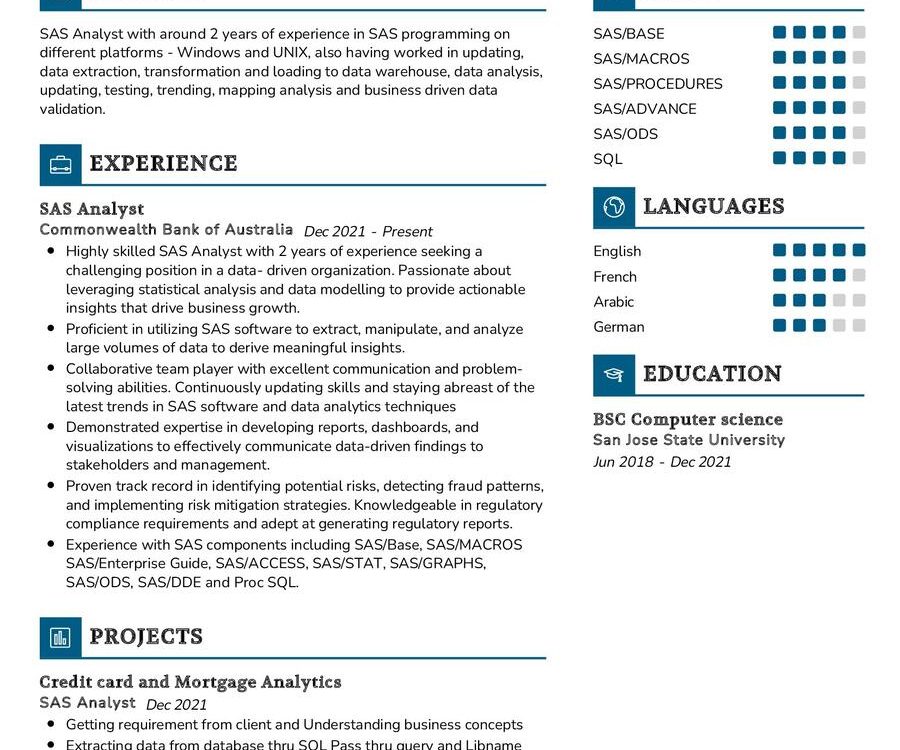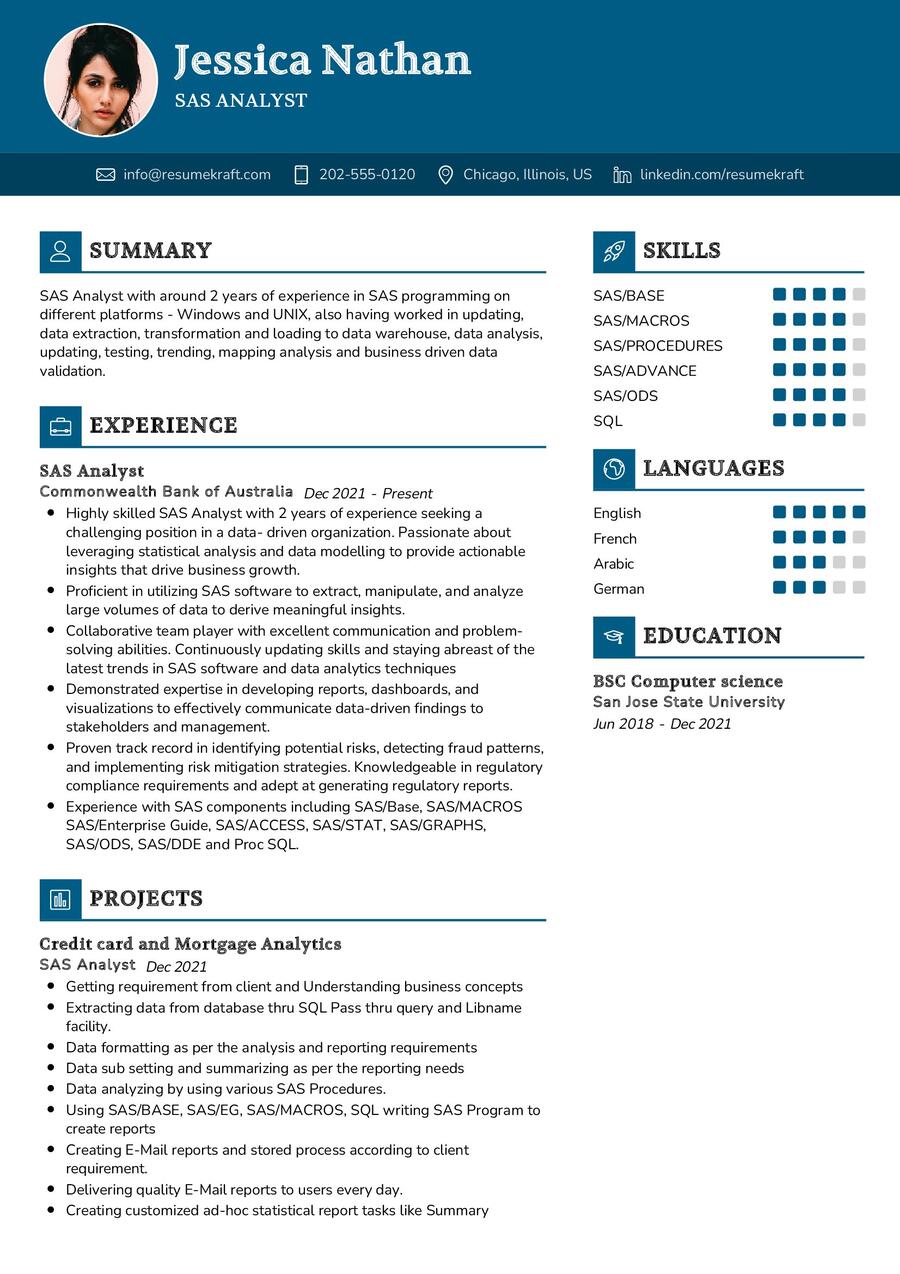Exploring the Role of a SAS Analyst
As the data-driven landscape continues to expand, the role of a SAS Analyst has become increasingly crucial in organizations worldwide. This position requires a unique blend of analytical skills, statistical expertise, and programming proficiency. Let’s delve into the multifaceted responsibilities and requirements that define the role of a SAS Analyst, a key player in transforming raw data into actionable insights.
Job Requirements for a SAS Analyst
Becoming a SAS Analyst involves meeting specific requirements, blending academic qualifications with hands-on experience. Below are the prerequisites to embrace the role:
- A Bachelor’s or Master’s degree in Statistics, Mathematics, Computer Science, or a related field, showcasing a strong foundation in the analytical domain.
- In-depth knowledge of statistical analysis, data manipulation, and data visualization using SAS software.
- Hands-on experience in programming languages such as SAS, SQL, and possibly Python or R.
- Strong problem-solving and critical-thinking skills, honed through practical applications in the field.
- Effective communication skills to convey complex analytical findings to non-technical stakeholders.
- Experience with data warehousing, data modeling, and ETL processes.
- Knowledge of industry-specific regulations and compliance standards.
Additionally, obtaining certifications in SAS programming or data analytics can enhance your profile in the competitive job market.
Responsibilities of a SAS Analyst
The role of a SAS Analyst is diverse, involving a spectrum of responsibilities that contribute to effective data-driven decision-making. Let’s explore the key duties that define this role:
- Conducting in-depth data analysis to extract valuable insights and trends.
- Developing and implementing statistical models to support business objectives.
- Collaborating with cross-functional teams to understand data requirements and provide analytical solutions.
- Creating and maintaining automated reports and dashboards for regular performance monitoring.
- Identifying opportunities for process improvement based on data-driven findings.
- Ensuring data integrity and accuracy through rigorous validation and cleansing processes.
- Staying updated on industry trends and emerging technologies in analytics and data science.
Each responsibility comes with its own set of challenges and learning opportunities, shaping you into an analytical leader.
SAS Analyst CV Writing Tips
Crafting a standout SAS Analyst CV requires a strategic approach to highlight your skills and experiences effectively. Here are some tips to create a compelling document:
- Emphasize your hands-on experience with SAS software and other relevant programming languages.
- Showcase specific projects where your analytical skills made a tangible impact on business outcomes.
- Quantify your achievements with measurable results, such as efficiency improvements or cost savings.
- Highlight your ability to communicate complex findings to non-technical stakeholders.
- Include relevant certifications to validate your proficiency in SAS programming or data analytics.
Your CV is your professional narrative, weaving a story of your analytical journey and contributions to data-driven success.
SAS Analyst CV Summary Examples
Your CV summary is the first impression you make on potential employers. Craft a powerful snapshot of your expertise with examples like:
- “Experienced SAS Analyst with a proven track record in leveraging statistical models to drive business insights and improve decision-making processes.”
- “Detail-oriented SAS Analyst with a focus on data accuracy and integrity, contributing to a 15% increase in operational efficiency through advanced analytics.”
- “Strategic SAS Analyst adept at transforming complex data sets into actionable recommendations, facilitating data-driven strategies for organizational growth.”
Each summary is a window to your analytical journey, offering a glimpse of your skills and the value you bring to the table.
Create a Strong Experience Section for Your SAS Analyst CV
Your experience section is the heart of your CV, detailing your analytical journey and contributions to each role. Consider examples like:
- “Led a team in developing predictive models, resulting in a 25% improvement in forecasting accuracy.”
- “Implemented data validation processes, ensuring data accuracy and reducing errors by 30%.”
- “Collaborated with marketing teams to analyze customer behavior, leading to targeted campaigns and a 20% increase in customer engagement.”
Each experience is a chapter in your analytical story, showcasing your impact and achievements.
Education Section for Your SAS Analyst CV
Your educational background is a critical element in your SAS Analyst CV. List your academic achievements like:
- Master of Science in Statistics, XYZ University, a foundation in advanced statistical methods and data analysis, 2019.
- Bachelor of Mathematics, ABC University, a solid grounding in mathematical principles, 2017.
- SAS Certified Advanced Programmer for SAS 9, validating your expertise in SAS programming, 2020.
Each educational qualification is a building block, contributing to your analytical proficiency.
SAS Analyst Skills for Your CV
Your skill set is your toolbox, showcasing your abilities in the analytical domain. Essential SAS Analyst skills include:
Soft Skills:
- Analytical thinking, the ability to dissect complex problems and derive meaningful insights.
- Effective communication, conveying analytical findings to non-technical stakeholders.
- Attention to detail, ensuring accuracy in data analysis and reporting.
- Collaboration, working seamlessly with cross-functional teams to achieve common goals.
- Problem-solving, applying statistical methods to address business challenges.
Hard Skills:
- Proficiency in SAS programming, using statistical procedures to analyze data.
- Data visualization, translating complex data into visual representations for easy interpretation.
- SQL, Python, or R programming for comprehensive data analysis.
- Data modeling, designing and implementing structures for efficient data storage and retrieval.
- Experience with data warehousing, ensuring centralized and accessible data repositories.
Each skill is a tool, aiding you in providing valuable insights and driving data-driven strategies.
Common Mistakes to Avoid When Writing a SAS Analyst CV
Avoiding common pitfalls in your SAS Analyst CV is crucial. Steer clear of mistakes such as:
- Using generic language, tailor your CV to showcase your unique fit for the SAS Analyst role.
- Focusing only on job duties, elaborate on achievements to provide depth to your narrative.
- Underestimating the importance of a cover letter, use it to connect with potential employers and express your enthusiasm for the role.
- Overloading your CV with technical jargon, ensure clarity and accessibility for a diverse audience.
- Skipping proofreading, maintain a professional image by presenting error-free documentation.
Avoid these mistakes to create a CV that is both authentic and compelling, setting you apart in the competitive job market.
Key Takeaways for Your SAS Analyst CV
As you wrap up your journey through this comprehensive guide, remember these key points when crafting your SAS Analyst CV:
- Highlight your hands-on experience with SAS software and other programming languages.
- Quantify your achievements to demonstrate the impact of your analytical skills on business outcomes.
- Showcase your ability to communicate complex findings to non-technical stakeholders.
- Include relevant certifications to validate your proficiency in SAS programming or data analytics.
Finally, feel free to utilize resources like AI CV Builder, CV Design, CV Samples, CV Examples, CV Skills, CV Help, CV Synonyms, and Job Responsibilities to create a standout application and prepare for the SAS Analyst job interview.
Armed with these insights and tips, you are now ready to craft a CV that is a true reflection of your analytical journey, skills, and aspirations. Remember, your CV is not just a document; it is a canvas where you paint your career story, a story of growth, learning, and analytical prowess. Best of luck!


